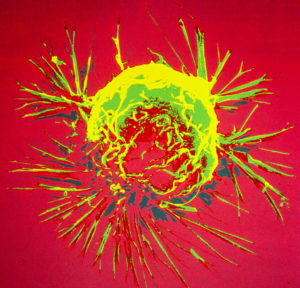
Electron micrograph of a single cell of breast cancer, one of the cancers for which risk increases with alcohol consumption. Credit: National Cancer Institute
UPDATE 2.14.23: Since posting this in 2017, immunotherapy has advanced by leaps and bounds. Now, Science Tech Daily reports that supercharged T-cells could be a way to kill pancreatic cancer with minimal side effects. They write:
Researchers at the University of California San Francisco (UCSF) have developed a new T cell-based immunotherapy that selectively targets cancer cells, producing a powerful anti-cancer cytokine specifically when it encounters tumors. This therapy effectively eliminated melanoma and pancreatic cancer in mice, with minimal side effects. This represents a promising new approach for treating these and other difficult-to-treat cancers.
The cells deliver IL-2, a naturally-occurring inflammatory molecule produced by the immune system that has powerful anti-cancer effects. It supercharges T cells, which are immune cells that can eliminate cancer cells and fight infection. IL-2 potent anti-cancer effects have been long-known, however, systemic administration of IL-2 has been limited due to the severe side effects it can cause.
In the study, which was recently published in the journal Science, the researchers were able to keep the cytokine contained within the cancer by programming the tumor-infiltrating T cells to make their own IL-2 when they recognized a cancer cell.
“We’ve taken advantage of the ability of these cells to be local delivery agents and to crank out their T-cell amplifiers only when they recognize they’re in the right place,” said Wendell Lim, Ph.D., the Byers Distinguished Professor in cellular and molecular biology, director of the UCSF Cell Design Institute and senior author on the study. “I think this is a model for how we can use cell therapies to deliver many types of potent but toxic therapeutic agents in a much more targeted manner.”
Slipping past the barriers
Cellular therapies have been highly effective against many blood cancers, where the cells are easily accessible because they are floating freely. Solid tumors, however, build multiple defensive walls that prevent therapeutic T cells from entering. And even if the cells do get into the tumor, they often tire out before they’re able to finish off the cancerous cells.
Originally posted October 16, 2017.
Doctors are turning to what might be the best weapon you’ve got against cancer, your own body. Immunotherapy is a technique that uses a body’s own defenses against the sickness. Doctors are increasingly exploring the use of immunotherapy to treat patients for a range of cancers. The success they are having is creating a stir in the medical profession. It’s possible patients with certain types of cancer could see immunotherapy become a standard treatment. Thomas Burton writes:
The science of using immunotherapy to treat cancer is advancing rapidly, marked by the National Cancer Institute’s recent disclosure that a metastatic breast-cancer patient is now cancer-free, regulators’ expected approval of a major lymphoma treatment this fall and the unveiling Thursday of a partnership between government researchers and drugmakers.
Immunotherapy, or immune-cell therapy, describes a range of treatments that harness a patient’s own immune system to target cancer. The approach doesn’t work in all patients, but its success against some hard-to-treat cancers makes it the most closely watched area in cancer pharmaceuticals.
Read more here.





